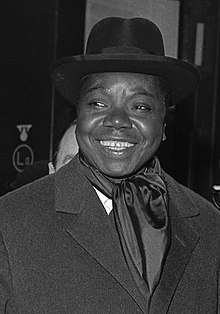Josué Couto
This article is incomplete because it is pending further input from participants, or it is a work-in-progress by one author. Please comment on this article's talk page to share your input, comments and questions. Note: To contribute to this article, you may need to seek help from the author(s) of this page. |
Josué Couto | |
|---|---|
 Couto in Swetania in 1949 | |
| 2nd President of Maracao | |
| In office May 16, 1944 – October 14, 1957 | |
| Prime Minister | Matheus Moreno |
| Preceded by | Renato Guimarães |
| Succeeded by | Matheus Moreno |
| 1st Prime Minister of Maracao | |
| In office January 9, 1934 – May 16, 1944 | |
| President | Renato Guimarães |
| Succeeded by | Matheus Moreno |
| Technical Secretary of the Revolutionary Liberation Front of Maracao | |
| In office May 16, 1944 – October 14, 1957 | |
| Preceded by | Renato Guimarães |
| Succeeded by | Matheus Moreno |
| Personal details | |
| Born | Josué Couto do Rosário January 12, 1910 Porto Leste, Maracan Empire |
| Died | October 14, 1957 (aged 47) Covancas, Maracao |
| Cause of death | Tuberculosis |
| Resting place | February 26th Mausoleum, Rozem, Maracao |
| Nationality | Maracan |
| Political party | Revolutionary Liberation Front |
| Spouse | Cesária Bandeira (m. 1941) |
| Military service | |
| Allegiance | Revolutionary Liberation Front (1932–1934) |
| Years of service | 1932–1934 |
| Battles/wars | Liberação |
Josué Couto do Rosário (January 12, 1910 – October 14, 1957; aged 47) was a Maracan Nemtsovist revolutionary, guerrilla and politician who was influential in the Liberação and the early foundation of the Republic of Maracao. With a storied military and political career that lasted over 25 years, Couto is regarded as one of the founding fathers of the Maracan nation, along with friend and associate Renato Guimarães. Couto was the main force behind Maracao's progression into a dominant-party state under the FRL, as well as increased nationalisation of Maracan industries and the continual promotion of native culture and the reintegration of the Nati into Maracan society.
Born in Porto Leste in 1910, Couto's childhood was sidetracked by the beginning of the Great War, which saw effective martial law declared in Maracao as Marirana joined the Entente in the war. With the threat of Arucian invasion a constant threat, Couto was almost permanantly locked inside his house, a time where he began reading influential socialist literature, particularly that of Yuri Nemtsov as well as tales of revolutions in Chistovodia and Swetania. Couto adopted the ideology around age 18, and eventually participated in early revolutionary gatherings with Guimarães and others in 1931, and was a founding member of the FRL in 1932. With noted excellence in writing and public speaking, Couto was the main voice behind the FRL movement and the Liberação, with his speeches inspiring many Maracans to revolt against Marirana on the island. Couto also secured Grand Alliance funding and backing in 1933, which greatly progressed the revolution. When Maracao gained its independence, Couto was the country's first Prime Minister.
When Guimarães died in 1945, Couto succeeded him as per the constitution. His presidency oversaw the official abolishment of native reserves and villages and the introduction of constitutional amendments regarding the Nati as equal to the Bahian and Euclean populations of the island - effectively making their discrimination illegal. Couto was praised for his rapid progression of native rights on the island, which far exceeded any country in the Asterias during his tenure. The Association for Nati Culture and Rights referred to him as the "modern cacique" in 1948, a title he was humbled by and eventually adopted officially in 1949. Couto also oversaw the nationalisation of many of the remaining industries and businesses in Maracao, permitting only small, independent businesses to be able to run independent of the state. Economic plans and state socialist economics were also widely implemented throughout Couto's tenure. He died in the resort town of Covancas of tuberculosis in 1957.
Couto was buried at the February 26th Mausoleum in Rozem upon his death, with a state funeral attended by much of the AIS. He is commended for his policies regarding the native population and commended in Maracao for the sweeping nationalisations, an important aspect of Nemtsovism, and also for implementing the first economic plans. However is also criticised for transforming Maracao into the dominant-party state it is today.